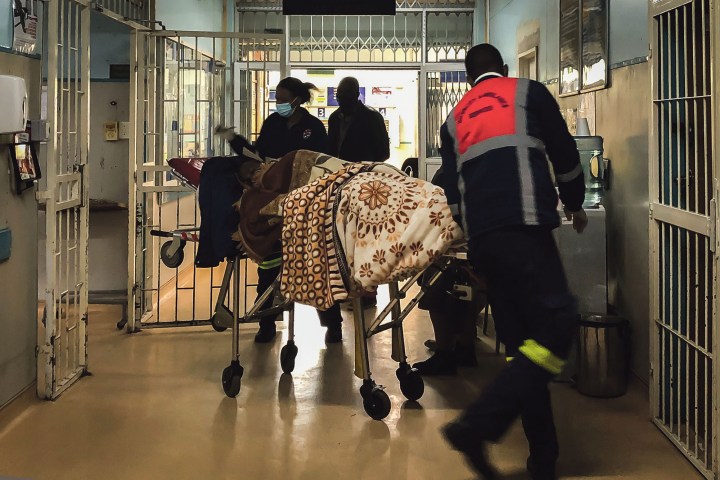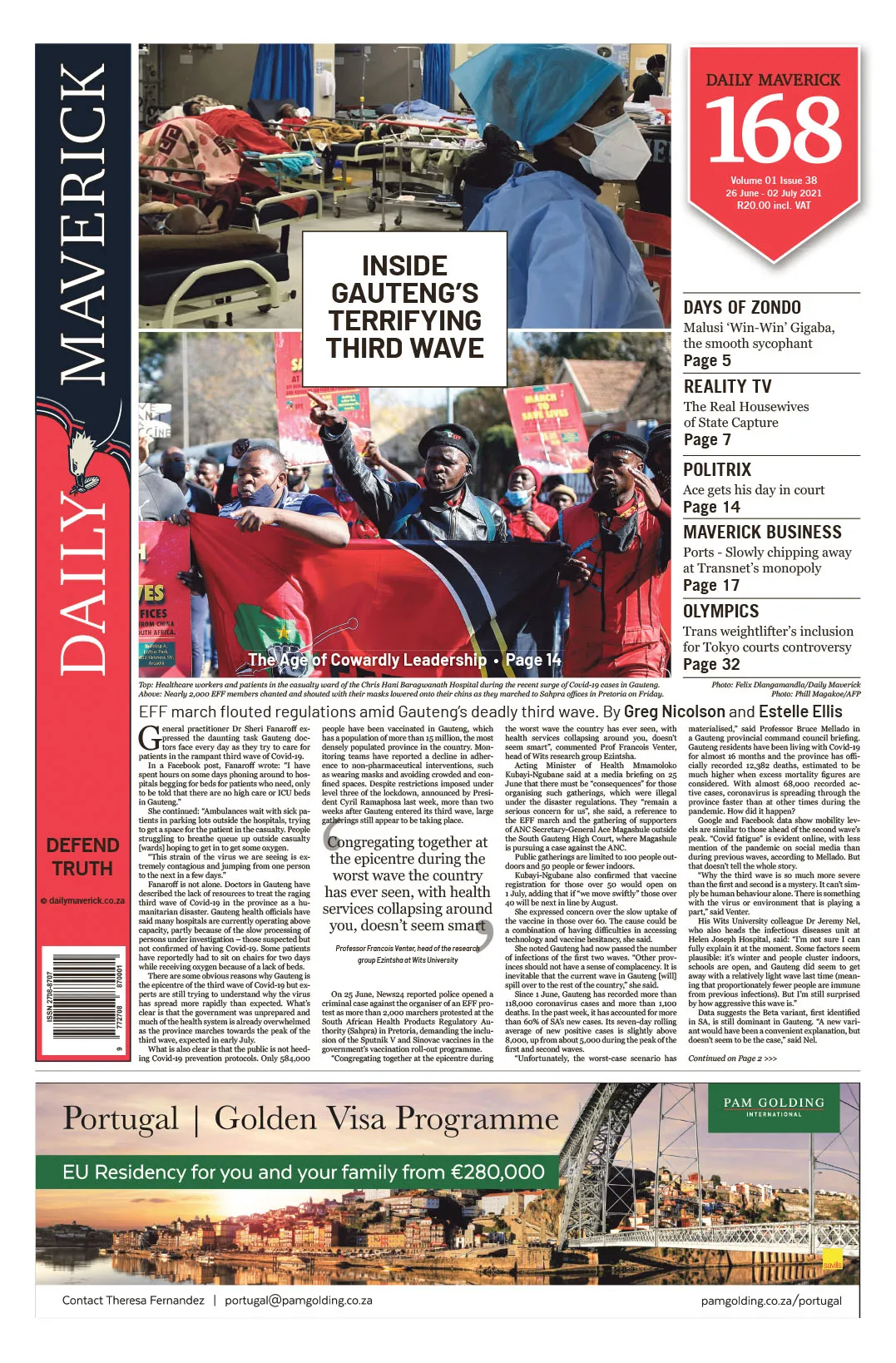DM168 CORONAVIRUS
Provinces and the pandemic: KwaZulu-Natal, Eastern and Western Cape brace for the Covid third wave

Other provinces are realising they are not immune as Covid-19 infections increase.
First published in the Daily Maverick 168 weekly newspaper.
Although Gauteng and the Free State are currently the hardest hit by the third wave of the Covid-19 pandemic, officials in other provinces have been warned not to be complacent in their response to the pandemic.
As of 23 June, the National Institute for Communicable Diseases (NICD) reported that there were at least 17,493 new Covid-19 cases in the country, bringing the total number of confirmed cases to 1.86 million. The death count stands at 59,258 people.
Officials in provinces around the country are watching what is happening in Gauteng and putting in place contingency plans.
KwaZulu-Natal premier Sihle Zikalala expressed concern about the current figures of other provinces, saying KZN was not immune.
“About a month ago, KwaZulu-Natal was registering an average of 130 to 150 new infections. Sometimes, our infections would go as low as 70 to 80 or so. But over the past two weeks or so, we have been recording more than 500 new cases each day; with only a few exceptions, where the number would be around 400,” said Zikalala.
The province recorded at least 917 new cases by Wednesday, bringing the total number of cases to 348,604. He said the province was fortunate when compared to other provinces, but this did not mean there was room for complacency.
“We rank as the fourth-highest in terms of fatalities countrywide following the Eastern Cape, Gauteng and the Western Cape,” continued Zikalala.
According to him, as of 20 June 2021, 677 patients had been admitted in both public and private facilities; of those admitted, at least 110 required intensive care services. Most of those in the ICU were in private facilities.
Zikalala was hopeful that the province would turn the tide. The province has been pushing its vaccination campaign, and 362,226 senior citizens and more than 127,000 healthcare workers (80%) have been vaccinated. He emphasised that it was still critical to adhere to non-pharmaceutical interventions as a way to avoid a further surge in infections.
Cross-province infection has been blamed as part of the reason for the rise in infections in some of the districts in the Eastern Cape.
Spokesperson Sizwe Kupelo said that there had been a constant increase in Covid-19 cases in areas such as the Nelson Mandela Bay over the past four weeks. He said the most concerning area has been the Joe Gqabi District Municipality, because it borders the Free State – where a third wave officially kicked in in May.
He expressed further concerns over the number of cases in areas such as Inxuba Yethemba in the Chris Hani District, Walter Sisulu in Joe Gqabi, East London in the Buffalo City Municipality, Kouga and Dr Beyers Naude in the Sarah Baartman District.
The Eastern Cape recorded 637 new cases on 23 June. The province’s total number of cases was 203,709.
Nevertheless, the province was making all the necessary provisions to prepare for a possible third wave.
“The department has been monitoring the availability of beds and oxygen in all districts with priority given to those that are showing a sign of increase in Covid-19 cases,” he said.
He added that PPE distribution had been increased in an effort to ensure that frontline workers were protected.
Addressing the issue of the capacity of hospitals, he said the province had more than 2,000 beds and 251 ICU beds and that over 30 hospitals had been fitted with bulk oxygen.
To curb staff shortages, he said the department was employing more nurses and had made plans to allocate Community Development Workers, and they had expanded the contact tracing programme in order to manage the surge.
He urged communities to register for vaccination and to adhere to Covid-19 regulations.
Surveillance
Having learnt from the second wave, the Western Cape Department of Health has not let down its guard and has kept its surveillance systems in place throughout the pandemic, according the department spokesperson Mark van der Heever.
He said the province, which reported at least 1,778 Covid-19 infections on 23 June, had also set up a trigger system in preparation for a third wave, aimed at guiding their response, reducing transmissions and preparing health services. The province has one of the highest number of new cases alongside Gauteng.
Van der Heever said they had enough bed capacity to respond to the rise in Covid-19 cases, including those in need of ICU.
He said the general bed use rate for the province was at 86%, of which 24% is for Covid-19. Afrox’s Western Cape plant had pledged to scale up the provision of oxygen if required but the province would continue to monitor its usage.
He said that a total of 31.2 tonnes of oxygen a day is being used by the private and public healthcare sector, with the public sector using 17.4 tonnes a day.
He said it was critical to prioritise the health and safety of healthcare workers to combat the third wave. The province had appointed additional staff.
“To ensure that we have enough staff during the peak of infections, where health workers are most likely to become infected, we have appointed an additional 717 healthcare workers and support staff. They will assist with both Covid-19 treatment and in our vaccination campaign. Healthcare workers will also be offered rotational leave to rest between April and June 2021,” said van der Heever.
Although these provinces believe that they are ready and have taken all proper precautions in preparation for the possibility of a third wave, unions and health experts have expressed concern.
The Western Cape acting provincial secretary for the Democratic Nursing Organisation of South Africa (Denosa), Toko Tyilekile, said the province was far from ready for a third wave.
She said they were worried because massive alcohol and gang-related violence continues to put pressure on health facilities. Besides that, there was a shortage of healthcare workers across the board.
She added that there should be a focus on “increasing the total numbers of healthcare workers of all categories, closing of alcohol [outlets] and proper management of the societal disorders that lead to influx of patients.”
Interprovincial infections
Mandla Shabangu, the Denosa representative in KZN, believes KZN is on the right path and showed progress in the way it handled the second wave of Covid-19, but interprovincial infections were a cause for concern.
He said he was worried that lack of serious restrictions on travelling, especially in the provinces most affected at the moment, would lead to KZN cases skyrocketing. For him, another troubling factor was the pace at which the vaccination process was going.
“We were hoping that by the time we start vaccinating people over 60, we would be done with vaccinating healthcare workers. Unfortunately, we find ourselves starting the programme of vaccinating teachers, having not finished either group. This might put a strain on the vaccination process and the workers,” said Shabangu.
He laid the blame squarely on the National Department of Health, which had “failed to get the vaccine to us on time and has let us down by disrupting our plans”.
Eastern Cape provincial secretary for Denosa Khaya Sodidi said, even though they hadn’t received any distressing calls from any of their members, there is a huge concern about the “chronic shortage of workers in the province”,
He also raised issues about the reporting of Covid-19 cases in the province. “On the ground our members are telling us that there are a lot of cases, but the province is reporting less,” he said.
Provinces unready
South African Medical Association of South Africa (Sama) Deputy Chairperson Dr Mvuyisi Mzukwa said the provinces were not ready for a third wave. He said one of the causes of Gauteng’s problems was that makeshift facilities designated for Covid-19 were dismantled after the second wave.
Also, he said, hospitals did not have adequate staff. He said this was the case for many provinces including KZN and the Eastern Cape which he said was “on the brink of collapse” because many doctors were leaving the province.
He added that KZN was also far from ready as it also had massive staff shortages.
“In the last wave KZN was ill-prepared and we don’t believe that they are prepared even now. The problem is that departments are multitasking healthcare workers – expecting them to focus on the vaccination campaign, while attending to the pandemic. This is a serious mistake,” warned Mzukwa.
Acting Deputy Vice-Chancellor at the University of KwaZulu-Natal Professor Mosa Moshabela has warned provinces, saying it would be a mistake to see readiness to deal with the third wave as having enough hospital beds and wards. He said this “would be mopping the floor while the tap is open”. Moshabela said provinces should be doing more to prevent infections in the population to reduce the numbers of those infected.
He said the one thing that has been done right is accelerating the vaccination of healthcare workers.
“You could move other things around … move around facilities, lobby for increased oxygen … open up hotels and other places and facilities for people to find space to be admitted, but you can’t train healthcare workers overnight,” he said.
The vaccination process has “helped prepare the healthcare workforce needed to deal with the third wave”.
But whether the beds are going to be enough or not is another matter, he said.
“My argument is that Covid-19 is not controlled in hospitals. It’s controlled in communities. You don’t fight Covid-19 in the hospital. By the time you go into the hospital that is your last line of defence.” DM168
This story first appeared in our weekly Daily Maverick 168 newspaper which is available for free to Pick n Pay Smart Shoppers at these Pick n Pay stores.
"Information pertaining to Covid-19, vaccines, how to control the spread of the virus and potential treatments is ever-changing. Under the South African Disaster Management Act Regulation 11(5)(c) it is prohibited to publish information through any medium with the intention to deceive people on government measures to address COVID-19. We are therefore disabling the comment section on this article in order to protect both the commenting member and ourselves from potential liability. Should you have additional information that you think we should know, please email [email protected]"






 Become an Insider
Become an Insider